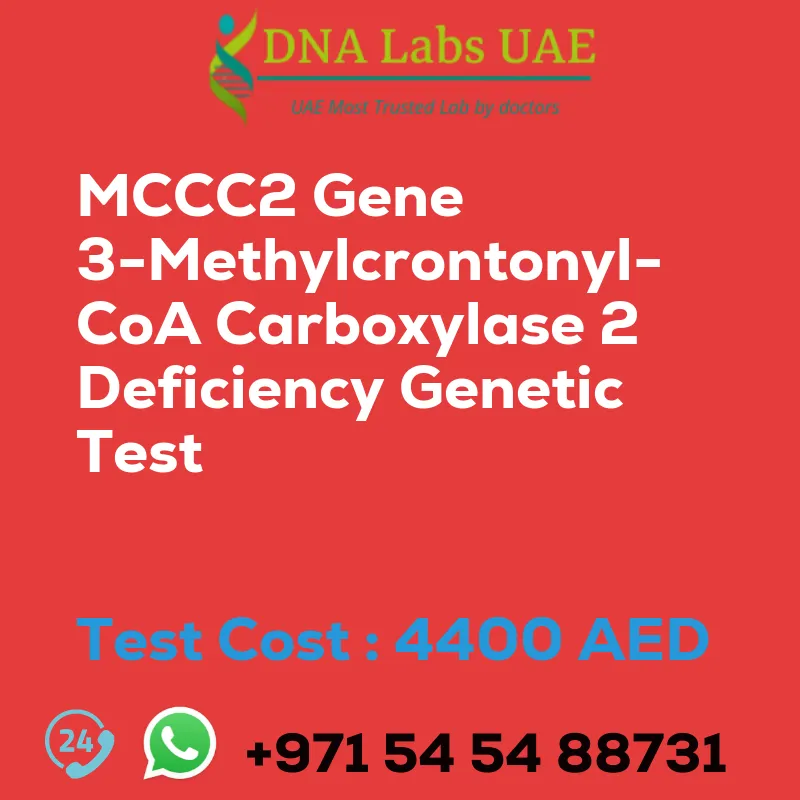MCCC2 Gene 3-methylcrontonyl-CoA carboxylase 2 deficiency Genetic Test
Test Name: MCCC2 Gene 3-methylcrontonyl-CoA carboxylase 2 deficiency Genetic Test
Components: Blood or Extracted DNA or One drop Blood on FTA Card
Price: 4400.0 AED
Report Delivery: 3 to 4 Weeks
Method: NGS Technology
Test type: Metabolic Disorders
Doctor: General Physician
Test Department: Genetics
Pre Test Information: Clinical History of Patient who is going for MCCC2 Gene 3-methylcrontonyl-CoA carboxylase 2 deficiency NGS Genetic DNA Test. A Genetic Counselling session to draw a pedigree chart of family members affected with 3-methylcrontonyl-CoA carboxylase 2 deficiency.
Test Details: MCCC2 gene, also known as 3-methylcrotonyl-CoA carboxylase 2, is responsible for encoding an enzyme that plays a crucial role in the breakdown of certain amino acids. Mutations in this gene can lead to a condition called 3-methylcrotonyl-CoA carboxylase 2 deficiency. 3-methylcrotonyl-CoA carboxylase 2 deficiency is an autosomal recessive disorder characterized by the inability to properly process and metabolize certain amino acids, particularly leucine. This can result in the buildup of toxic byproducts in the body, leading to a range of symptoms such as developmental delays, intellectual disability, feeding difficulties, seizures, and metabolic crises.
NGS (Next-Generation Sequencing) genetic testing is a method used to analyze and sequence multiple genes simultaneously. In the context of MCCC2 gene deficiency, NGS genetic testing can identify mutations or variants in the MCCC2 gene that may be responsible for the condition. This type of testing is often used to diagnose genetic disorders and can provide valuable information for treatment and management of the condition.
If you suspect that you or someone you know may have 3-methylcrotonyl-CoA carboxylase 2 deficiency, consulting with a healthcare professional or a genetic counselor is recommended. They can provide more information about the condition, discuss the benefits and limitations of genetic testing, and guide you through the testing process.
| Test Name | MCCC2 Gene 3-methylcrontonyl-CoA carboxylase 2 deficiency Genetic Test |
|---|---|
| Components | |
| Price | 4400.0 AED |
| Sample Condition | Blood or Extracted DNA or One drop Blood on FTA Card |
| Report Delivery | 3 to 4 Weeks |
| Method | NGS Technology |
| Test type | Metabolic Disorders |
| Doctor | General Physician |
| Test Department: | Genetics |
| Pre Test Information | Clinical History of Patient who is going for MCCC2 Gene 3-methylcrontonyl-CoA carboxylase 2 deficiency NGS Genetic DNA Test A Genetic Counselling session to draw a pedigree chart of family members affected with 3-methylcrontonyl-CoA carboxylase 2 deficiency |
| Test Details |
MCCC2 gene, also known as 3-methylcrotonyl-CoA carboxylase 2, is responsible for encoding an enzyme that plays a crucial role in the breakdown of certain amino acids. Mutations in this gene can lead to a condition called 3-methylcrotonyl-CoA carboxylase 2 deficiency. 3-methylcrotonyl-CoA carboxylase 2 deficiency is an autosomal recessive disorder characterized by the inability to properly process and metabolize certain amino acids, particularly leucine. This can result in the buildup of toxic byproducts in the body, leading to a range of symptoms such as developmental delays, intellectual disability, feeding difficulties, seizures, and metabolic crises. NGS (Next-Generation Sequencing) genetic testing is a method used to analyze and sequence multiple genes simultaneously. In the context of MCCC2 gene deficiency, NGS genetic testing can identify mutations or variants in the MCCC2 gene that may be responsible for the condition. This type of testing is often used to diagnose genetic disorders and can provide valuable information for treatment and management of the condition. If you suspect that you or someone you know may have 3-methylcrotonyl-CoA carboxylase 2 deficiency, consulting with a healthcare professional or a genetic counselor is recommended. They can provide more information about the condition, discuss the benefits and limitations of genetic testing, and guide you through the testing process. |








